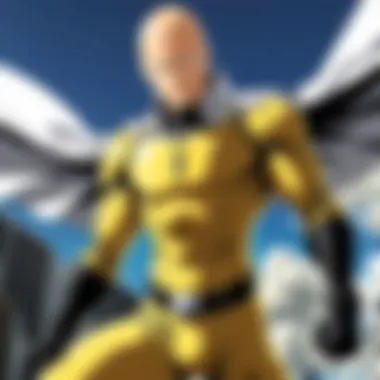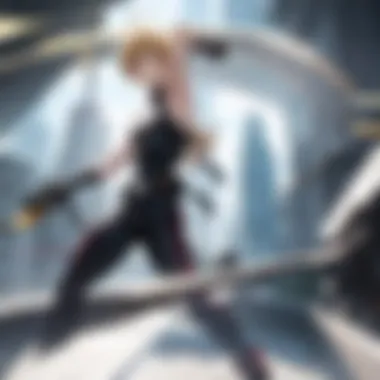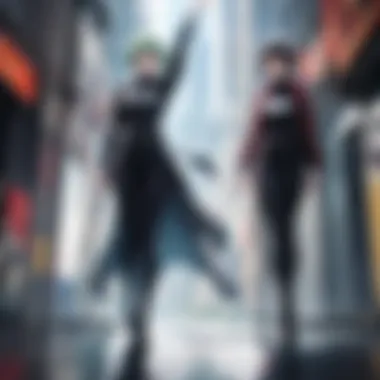Examining the English Dub of One Punch Man's Impact


Intro
Anime has grown significantly in global popularity, and One Punch Man stands out in this landscape. As an adaptation of the webcomic creator ONE, this anime series explores superhero themes through the lens of comedy and action. However, this article shines a light on a specific aspect of its reception: the English dub. We will evaluate the quality of voice acting and production decisions, examining how they shape the viewer's experience.
In addition to this, we will look into audience reception across various platforms and how it contributes to One Punch Man's legacy in the anime community. This exploration aims to give readers a nuanced understanding of the English dub, highlighting its importance within the broader narrative.
Anime Series Overview
One Punch Man is a unique anime series that revolves around Saitama, an overpowered superhero who can defeat any opponent with a single punch. This premise leads to a fascinating narrative where Saitama grapples with the ennui that comes with such overwhelming strength. The series cleverly parodies the superhero genre and challenges traditional tropes, making it both entertaining and thought-provoking.
Key themes of the series include the search for meaning, the nature of heroism, and societal expectations. Throughout the episodes, viewers witness Saitama’s journey alongside a diverse cast of characters, each with their personal motivations and growth.
The visual style of One Punch Man is another noteworthy aspect. The animation transitions from stunning fight sequences to humorous and expressive character designs. The soundtrack complements the series, enhancing both intense battles and comedic moments. Notable episodes, such as the introduction of new villains or the epic showdown in the Hero Association's exam, exemplify the show’s high production value.
Character Analysis
Main Characters
- Saitama: The protagonist who seeks a worthy opponent. His laid-back demeanor juxtaposes his extraordinary power.
- Genos: A devoted disciple who seeks revenge. His motivations drive much of the emotional weight in the series.
- Mumen Rider: Represents the everyman hero. His courage despite lacking powers adds depth to the narrative.
Relationships and Dynamics
The interactions between Saitama and his friends enrich the storytelling. Genos’ admiration for Saitama and their mentor-mentee relationship serve as a core element of the plot. The dynamics within the Hero Association also highlight differing ideologies on heroism and morality.
Impact on the Story
These characters drive the overall storyline forward, presenting unique perspectives that engage the audience. Fan theories around character arcs and future developments contribute to the discussions surrounding the series' depth.
Genre Spotlight
One Punch Man falls under the action-comedy genre, characterized by its blend of humor and thrilling fight scenes. This genre has evolved in the anime world, with series like Naruto and My Hero Academia paving the way for new narratives.
The historical context reveals how One Punch Man challenges established norms with its comedic take on the superhero trope. It invites audiences to reconsider their perceptions of what it means to be a hero.
Behind-the-Scenes Insights
The production of One Punch Man is notable for its meticulous attention to detail. From the initial concept to the final animation, several creative minds have contributed.
The production faced challenges, particularly with meeting deadlines and maintaining high animation quality. Decisions regarding voice casting for the English dub, for instance, were critical. Choices made in delivering lines shaped the perception of characters, influencing viewers’ emotional connection with the series.
Success factors include a dedicated team and the timely release, which built anticipation. The chemistry between the original creators and the dub team played a vital role in reaching a broader audience, ensuring that the humor and action translate effectively.
The English dub of One Punch Man exemplifies a balance between preserving original material and adapting to cultural preferences, enhancing viewer engagement.
As we continue to examine the English dub's impact, it is clear that it holds substantial relevance in shaping the legacy of One Punch Man.
Prolusion to One Punch Man
The One Punch Man series has emerged as a significant title in the landscape of anime. Understanding its introduction is essential as it sets the foundation for discussing its English dub. One Punch Man is not simply a parody of superhero tropes; it also offers deeper reflections on themes like heroism and existential ennui. As we dissect the English dub, it is helpful to recognize these core elements that the series presents. This understanding enables viewers to appreciate the intricate balance between humor and seriousness within the show.
Brief Overview of the Series
One Punch Man follows the journey of Saitama, an ordinary man who gains immense strength after a rigorous training routine. He possesses the ability to defeat any opponent with a single punch. This premise, while humorous on the surface, serves as a vehicle to explore larger ideas. Despite his power, Saitama suffers from boredom and a lack of recognition, which contrasts sharply with the traditional superhero narrative. Created by Yusuke Murata and originally a webcomic by ONE, the series gained massive popularity. It showcases a range of characters, from the selfless Genos to the gritty villains, each adding to the vibrant narrative.
Cultural Impact of One Punch Man
The impact of One Punch Man on anime culture is noteworthy. It has sparked discussions regarding the portrayal of heroes and the societal expectations placed upon them. This series has inspired various fan works, cosplay, and merchandise, solidifying its place in contemporary anime culture. The humor used in the series resonates with many, attracting diverse viewers from different age groups. Furthermore, the narrative challenges the concept of what it means to be a hero in modern society. This cultural dialogue remains relevant as new anime continue to emerge, often referencing One Punch Man in both homage and critique.
Understanding Anime Dubs


Dubbing in anime is a significant aspect that affects how the series is experienced by the audience. The process of translating and re-recording the original voice work transforms a show to fit another language, allowing a broader audience to access the content. This is particularly important for series like One Punch Man, which has gained immense popularity beyond Japan. Understanding anime dubs can illuminate how cultural nuances, humor, and emotion are conveyed to non-Japanese speakers. This section provides insight into the nature of anime dubbing, the differences between dubbed and subtitled versions, and how these factors contribute to the overall viewing experience.
Definition of Anime Dubbing
Anime dubbing refers to the process of replacing the original voice track of an animated series with dialogues in another language. This involves professional voice actors recording their lines to match the lip movements of the animated characters. The main goal of dubbing is to create a seamless experience, where the audience can engage with the story without being distracted by the need to read subtitles. It also aims to retain the original context and humor, while making adjustments for cultural relevance. Understanding this process is crucial for appreciating how series like One Punch Man adapt to different linguistic audiences.
Differences Between Dubbed and Subtitled Versions
The choice between watching a dubbed or subtitled version of anime can significantly affect the viewer's experience. Here are some key differences:
- Language Experience: Dubbing allows non-Japanese speakers to enjoy the series without reading subtitles. This can enhance immersion but may compromise the original voice acting nuances.
- Cultural Nuances: Dubs often adapt jokes and cultural references to make them more relatable to the target audience. This alteration can either enhance or detract from the original content.
- Voice Acting Styles: The performance style of voice actors in the dub may differ from the original. Each may bring unique interpretations to their characters.
Many viewers have strong preferences, based on their experiences with anime. Some feel that the original subtitled versions capture the essence of the series better, while others appreciate the accessibility of dubs. Ultimately, it often comes down to personal preference.
Availability of English Dub for One Punch Man
The availability of the English dub for One Punch Man is a significant aspect to address in this article. It serves as a gateway for many viewers who prefer watching anime in English. The English dub not only enhances accessibility but also ensures that the humor and nuances of the series resonate with a wider audience. Moreover, understanding where and how the dub can be accessed is crucial for those who wish to experience the series beyond the original Japanese version.
Streaming Platforms Offering the Dub
Several streaming platforms offer the English dub of One Punch Man, making it easy for fans to watch the series. Platforms like Crunchyroll and Funimation provide high-quality viewing experiences. Funimation, in particular, is known for its extensive library of dubbed anime, and it has become a go-to source for One Punch Man enthusiasts.
- Crunchyroll: Offers both subbed and dubbed versions, appealing to a diverse audience.
- Funimation: Known for its dedicated focus on dubs, providing robust voice acting options.
- Hulu: Also features the English dub, making it accessible to subscribers.
Each platform may vary in streaming quality and availability depending on geographical locations, but the fact that multiple options exist is a boon for the anime community.
and Blu-ray Releases
The home media release of One Punch Man includes versions with English dubbing. Blu-ray and DVD sets are available that offer both the original Japanese voice track and the English dub. This physical media allows fans to enjoy the series at their own convenience without relying on streaming services.
Key points regarding the physical releases include:
- Collector's Editions: Often feature exclusive content and behind-the-scenes material.
- Subtitles: Generally include subtitles for the dub, which aids viewers who may prefer to follow along.
- Quality: Blu-ray versions typically provide enhanced visual and audio quality compared to standard DVDs.
Availability in Different Regions
Availability can greatly differ based on your region. In many Western countries, the English dub is widely accessible through streaming platforms and DVD/Blu-ray options. However, in some areas, licensing restrictions may limit access.
- North America: Extensive access to both streaming and physical copies.
- Europe: Varies significantly; some nations have limited options, while others have full access to dubbed versions.
- Asia: Often more limited compared to Western counterparts, with subtitles being the primary option.
The Voice Acting Behind the Dub
The voice acting in the English dub of One Punch Man plays a crucial role in shaping the overall viewing experience. Voice actors bring characters to life, infusing them with personality and depth. This transformation can significantly alter how audiences perceive and connect with the narrative.
Quality voice acting can also enrich the comedic timing and the emotional nuances inherent in the story. Key performances can, therefore, enhance or detract from how well the humor and drama resonate with viewers. Moreover, understanding the roles that different actors play helps frame their performances in the larger context of the series.
Key Voice Actors and Their Roles
In the English dub of One Punch Man, several voice actors have made a notable impact. Among them is Zach Aguilar, who voices the protagonist, Saitama. His performance captures Saitama’s apathetic demeanor while also effectively conveying the character's subtle moments of frustration and excitement. Aguilar’s work allows viewers to appreciate the quirks of Saitama, transforming his monotone exclamations into something more engaging.
Max Mittelman, who plays Genos, complements Aguilar's performance well. Mittelman’s approach provides a contrast, as Genos exhibits passion and determination. This difference allows for a compelling dynamic between the characters. The chemistry between the two actors elevates the show's humor and emotional stakes.
Another notable mention is Erica Lindbeck, who voices Tatsumaki. Her interpretation of the character’s brash and fiery personality serves to immerse the viewer deeper into the world of One Punch Man.
In addition to these key players, the supporting cast features talented voice actors such as Chris Sabat and Crispin Freeman, who contribute distinct voices that enhance their respective characters. This varied selection of voice acting talent ensures that the dubbing remains engaging throughout.
Comparative Analysis of Voice Acting Styles
When comparing the English dub to its original Japanese version, differences in voice acting styles become evident. The Japanese voice actors deliver performances that encapsulate the culture and nuances of the characters. For example, the original Saitama voice actor, Makoto Furukawa, brings a unique levity and energy to Saitama that reflects a subtlety in the humor prevalent in anime culture.
In contrast, the English dub’s actors have opted to emphasize humor through more exaggerated expressions and delivery. While both styles effectively communicate the characters' traits, the English dub often leans toward accessibility, aiming to resonate with a broader audience.


This comparison reveals how cultural context influences voice portrayal. The Japanese audience may find specific expressions lighter and more humorous, while the English audience may appreciate a more direct approach to comedy.
Production Insights
Understanding the production aspects of dubbing is essential when evaluating the English dub of One Punch Man. This section highlights how studio involvement and the challenges faced during the dubbing process influence the overall quality and appeal of the finished product. Insights into production assists viewers in appreciating the meticulous effort that goes into creating a relatable and enjoyable dub experience.
Studio Involvement in Dubbing
The studio responsible for the English dub of One Punch Man plays a crucial role. Bang Zoom! Entertainment, the studio that handled the English version, is known for its high production standards. They bring together skilled voice actors and directors who understand the nuances of both the original material and the new audience.
Moreover, the studio manages various aspects of production, including script localization and voice direction. This means that localizing humor, cultural references, and emotional cues is a thoughtful process. For instance, capturing the essence of Genos's intense dedication requires not just talent, but also an understanding of the subtleties of character motivation. Each voice actor contributes to bringing the characters to life, guided by experienced directors who ensure the performances resonate with the audience.
Some important points regarding studio involvement include:
- Script Localization: Adjusting the script to fit English language and culture without losing the original intent.
- Voice Direction: Leading voice actors to deliver performances that align with the characters' personalities.
- Quality Control: Ensuring that sound mixing and editing maintain high standards.
Challenges Faced During the Dubbing Process
The dubbing of One Punch Man was not without its challenges. One significant issue is the synchronization of voice with mouth movements. Because anime is produced in Japanese, and then dubbed in English, timing becomes a critical element. If the dubbed dialogue does not align with the character's lip movements, it can disrupt the viewer's immersion.
Another challenge is the translation of humor and cultural references. Many jokes in Japanese are context-specific and do not translate directly into English. Adapting these jokes requires a blend of creativity and cultural sensitivity. For example, some gags rely on wordplay that simply does not exist in English. The team must find alternatives that evoke a similar response from the audience while remaining true to the original spirit of the show.
Also, voice actors must not only embody their characters emotionally but also adapt to the demands of the action sequences. Fast-paced dialogues and intense situations can be challenging, requiring actors to perform under pressure while maintaining clarity and emotion.
"Dubbing is an art form that requires lyricism and timing. It is not merely about translating words but conveying a whole experience."
The challenges faced in dubbing highlight the hard work and dedication necessary to deliver a satisfying product. By overcoming these obstacles, the production team ensures that the English dub of One Punch Man retains the show's charm, making it accessible and engaging to a broader audience.
Reception of the English Dub
The reception of the English dub for One Punch Man plays a crucial role in understanding its impact on the anime's broader audience. It reflects not only the general appeal of the series but also highlights how localization affects viewer engagement. Different perspectives from fans and critics provide insight into the effectiveness of the voice acting and its cultural adaptation. This evaluation is essential as it informs potential viewers, helping them decide whether the dub meets their expectations compared to the original Japanese version.
Viewer Opinions and Critiques
Viewer opinions on the English dub of One Punch Man vary significantly. Many fans have expressed a favorable view mainly due to the quality of the voice acting. For example, Max Mittelman, who voices Saitama, brings a unique dynamism to the character, balancing humor with the essence of Saitama's disinterest. Critics point out that such performances help convey the series' satirical nature more clearly than subtitles might.
While there are positive remarks, some viewers are critical. A common complaint is that certain comedic nuances might get lost in translation. Fans who are well-acquainted with the original Japanese version sometimes feel that the dub fails to capture the subtleties of the characters' personalities and relationships. This dissatisfaction often leads to discussions on platforms like Reddit and Facebook, where debates about the merits of dubbed versus subtitled anime are frequent.
"While the dubbing is solid, I often prefer the original for the humor and timing. It's a different experience entirely" - A recurring sentiment among bilingual fans.
Other feedback addresses the pacing of the dub. Some viewers have noted that the timing of jokes and dialogue delivery sometimes does not match the original. This can disrupt emotional beats that the creators intended. Such critiques emphasize the importance of harmonizing voice acting with visual storytelling for an effective adaptation.
Comparative Popularity of Dub vs. Sub
Understanding the comparative popularity of dubbed versus subtitled versions of One Punch Man reveals important trends in audience preferences. The English dub has gained a significant following, but the original Japanese version retains strong support as well. Each format offers distinct advantages that cater to differing viewer needs.
Popularity Factors of Dub:
- Accessibility: The English dub makes it easier for non-Japanese speakers to engage with the story.
- Familiarity with Voice Actors: Many viewers have preferences for specific English voice actors, which can enhance the viewing experience.
- Cultural Adaptation: The adaptation process sometimes includes localized jokes and references that resonate better with the Western audience.
Popularity Factors of Sub:
- Authenticity: Many fans argue that subtitled versions retain the original performance's intent and flavor.
- Cultural Nuances: Subtitles often allow for deeper appreciation of cultural references that may be lost in translation.
- General Preference for Original Voice Acting: Some viewers feel that the original actors deliver a more genuine performance.
Overall, both formats have their respective audiences. Reviews on various platforms suggest that while the dub is highly regarded, a loyal base continues to champion the subtitled format. Understanding these perspectives helps map out the path for future adaptations and how they engage with a global audience.
Impact on Audience Experience
The English dub of One Punch Man holds significant importance and greatly influences the audience experience. Dubbing not only allows non-Japanese speakers to enjoy the series, but it also impacts the emotional depth and context of the storytelling. A well-executed voice cast can create an immediate bond with viewers, enhancing their engagement with the characters and plot. The emotional resonance achieved through effective voice acting is crucial for the viewer’s journey throughout the series.


When discussing the impact on audience experience, several factors come into play. Among those, emotional connection and accessibility are paramount.
Emotional Connection Established Through Dubbing
Dubbing transforms the original dialogue into a new auditory experience, designed for an English-speaking audience. This transformation can lead to an emotional connection that might not be achieved through subtitles alone. In One Punch Man, where humor and dramatic moments coexist, the chosen voices contribute significantly to the viewers' reactions.
The English dub includes skilled actors who bring the characters to life in ways that resonate with the audience. For example, the voice of Saitama is often noted for its laid-back and indifferent tone, which aligns with his character as a hero bored by the lack of challenge. This vocal portrayal allows viewers to relate to his struggles despite his overwhelming power. Similarly, characters like Genos are given voices that showcase their intensity and determination, creating a stark contrast that adds depth to the story.
A block of text might convey information, but it takes skilled vocal delivery to convey genuine feelings.
"The heartfelt delivery of a line can create a moment of connection that remains long after the credits roll."
As audiences form attachments to these characters, the emotional stakes in the narrative become more significant. The English dub serves to maintain this connection, providing context that facilitates understanding and empathy.
Accessibility for Non-Japanese Speakers
One of the most crucial aspects of the English dub is its role in accessibility. Anime fans come from diverse backgrounds, and not everyone has the capacity or desire to read subtitles. Dubbing allows a broader audience to engage with One Punch Man, reaching those who might otherwise miss out due to language barriers.
Accessibility encompasses more than just language; it also includes the pacing of narration. Viewers can follow the action without the need to read text on the screen, allowing them to fully immerse in the visuals, animation, and storyline. This aspect is particularly relevant in action-packed scenes or comedic moments, where the timing of speech delivery can significantly alter the experience.
Furthermore, the dubbed version enables casual viewers to enjoy the series while multitasking. They may listen while doing other activities, a convenience that subtitles cannot match. This availability enhances the overall engagement with the content, encouraging more people to explore the anime medium.
Thus, through its emotional connection and enhanced accessibility, the English dub of One Punch Man plays an essential role in shaping the viewing experience, making it more impactful and enriching for a global audience.
Future Developments in Anime Dubbing
The landscape of anime dubbing is continually evolving due to various factors. As technology advances, voice acting and production techniques undergo significant transformations. This article examines the future developments in anime dubbing and their implications for viewers of series like One Punch Man. Understanding these trends not only enriches the experience for fans but also shapes the industry as a whole.
Trends in Voice Acting Technology
The integration of advanced technology in voice acting is a crucial trend shaping the future of anime dubbing. Voice actors are now utilizing software that enhances the quality of their performances. Tools such as voice modulation and sound editing software allow for more diverse character portrayals. Actors can experiment with their voices, creating unique sounds that fit their roles better.
Additionally, artificial intelligence is making its way into the voice acting sphere. AI can assist in generating voice samples or even synthesizing speech for non-human characters. While this technology raises questions regarding the authenticity of voice performances, it also opens avenues for more creative storytelling. This is particularly relevant for shows with numerous characters or those requiring distinct audio cues.
"Voice acting technology is not just about sound; it's about how we narrate stories through these characters."
Beyond just performance, technological advancements also mean better recording techniques. Enhanced microphones and studio setups lead to clearer and cleaner audio outputs. This ensures that the dubbing matches the high production quality expected from modern anime, such as One Punch Man.
Evolving Standards in Dubbing Quality
As the fanbase for anime grows across various demographics, the expectations for dubbing quality are also changing. Audiences are becoming more discerning, demanding high-quality adaptations. This has led to evolving standards that production teams must meet to satisfy viewers' expectations.
One significant aspect is the alignment of dialogue with original intent. English adaptations are now focusing on staying true to the original tone and humor of the series. The trend is to create scripts that feel natural and engaging without losing the essence of the original Japanese dialogue.
Moreover, cultural context is being more heavily considered in translations. Dubbing projects are now employing consultants with deep knowledge of both Japanese and Western cultures. This helps in adapting references or jokes that may not resonate with a global audience.
The engagement with fan feedback is another evolving standard. Production teams are increasingly monitoring audience reactions on various platforms, such as Reddit or dedicated fan forums. This real-time feedback loop allows for constant improvement in dubbing practices skimming adjustments in casting and script choices.
In summary, the future of anime dubbing is poised for notable advancements. Trends in technology and evolving standards in quality will shape the landscape. As anime continues to expand globally, these changes will enhance the viewing experience for longtime fans and newcomers alike.
Epilogue
The conclusion serves as a crucial component of this article. It highlights the significance of the English dub for the anime series One Punch Man, emphasizing how it enhances the overall viewing experience. The dub not only brings the story and characters to life in a way that is accessible to a global audience, but it also provides an opportunity for nuanced interpretations of the original material.
Summary of Findings
The exploration of the English dub focused on multiple aspects that contribute to its reception. Key findings include:
- Voice Acting Quality: The performances of voice actors significantly impact audience perception. The cast has been praised for their ability to embody each character convincingly.
- Production Insights: Understanding the studio involvement and challenges faced during the dubbing process reveals a dedication to quality and authenticity.
- Viewer Reception: Viewer opinions highlighted a preference for certain nuanced aspects of the dub, showcasing how personal experiences shape their enjoyment of the anime.
The combination of these elements underscores the importance of a well-executed dub in making the series resonate beyond its original language.
Final Thoughts on the Dubbed Experience
The dubbed experience of One Punch Man is not merely a translation of dialogue; it is an adaptation that considers cultural contexts and emotional weight. This adaptation allows non-Japanese speakers to connect with the storyline on a deeper level. The accessibility of the English dub has played a pivotal role in broadening the series' reach, allowing it to become a touchstone in anime culture.
This makes understanding its impact essential not only for fans of the series but also for anime enthusiasts in general.







